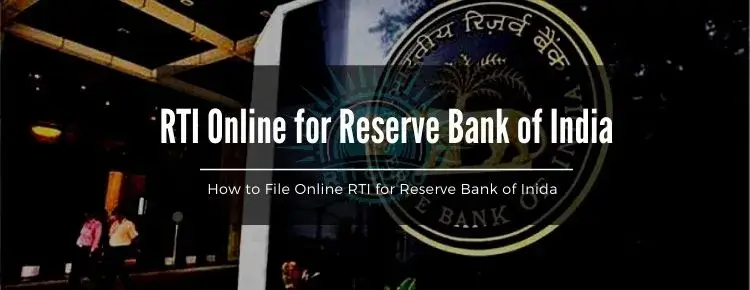
The Reserve Bank of India is a public authority as defined in the Right to Information Act, 2005. As such, the Reserve Bank of India is obliged to provide information to members of the public.
The Reserve Bank of India has a setup correspondence strategy. Under this, the Reserve Bank of India consistently delivers data and information on the Indian economy, banking, and money. It delivers the data and information at ordinary periodicity – every day, week after week, month to month, quarterly, six month to month, and yearly. What's more, it additionally releases information, as and when required, through occasional publications, such as, studies and reports.
RTI Online For RBI | Online RTI process | File RTI Against Bank | File RTI Online
The Reserve Bank additionally puts in the public domain its guidelines identifying with banking, fund, unfamiliar trade, and other related subjects. Further, the Reserve Bank additionally scatters data, particularly of general enthusiasm, through day by day public statements.
In case you have a complaint against any branch of the Reserve Bank of India for the low quality of services delivered, you may send your complaint to the Complaints Redressal Cell of the individual Regional Office of the Reserve Bank of India.
Citizens of India should ask for information in writing, obviously indicating the information looked for under the Right to Information Act, 2005. The application for the request should give the contact details (postal location, phone number, fax number, email address) with the goal that the candidates can be contacted for clarifications or the information. Since according to the Act, information can be furnished only to citizens of India, you should give your resident status also. A resident can likewise lodge information through the RTI online portal where the RTI fees can be paid on the web and the applicant gets the registration number upon submission of the request and can track the RTI application.
Step 1: The application might be composed or flawlessly written by hand, wherein mention on "Application under RTI act 2005". The application may ideally be written however an email is acknowledged as a mode according to law.
Step 2: Some Public Authorities have conceived their own format for the applications. However, there is no impulse under the law to adhere to such proforma. Applications can't be dismissed on the ground that they were not in the endorsed proforma. The application ought to be in English, Hindi, or the official language of the territory where an application is being made.
Step 3: The address is to the competent authority, (need not mention his/her name), basically address the "public information officer".
Central Public Information Officer/Deputy General Manager
Human Resources Management Department
Reserve Bank of India, Central Office
Step 4: The application ought to be in a basic and simple language. Mention your question points, abstain from asking vague questions, and ask direct questions. Avoid using too specialized terms or legitimate language.
Step 5: Attach Government RTI Fee as IPO/DD/MO and so on as pertinent with the RTI Application.
Step 6: Undersign the application, remember to take a copy for your future references. At the end of the application make a declaration that you are an Indian resident.
Step 1: Click on Apply Now and Fill all the required details
Step 2: Proceed with payment
Now you can track the status of your RTI Application.
The furnishing of information under RTI Act in the Reserve Bank of India is done in a decentralized manner with Chief General Managers/ Advisers/General Managers – in –charges of our various Central Office Departments designated as Central Public Information Officers (CPIOs) and in their absence, the other Chief General Managers/General Managers of the departments would be designated as CPIOs. The Executive Director has been designated as the Appellate Authority.